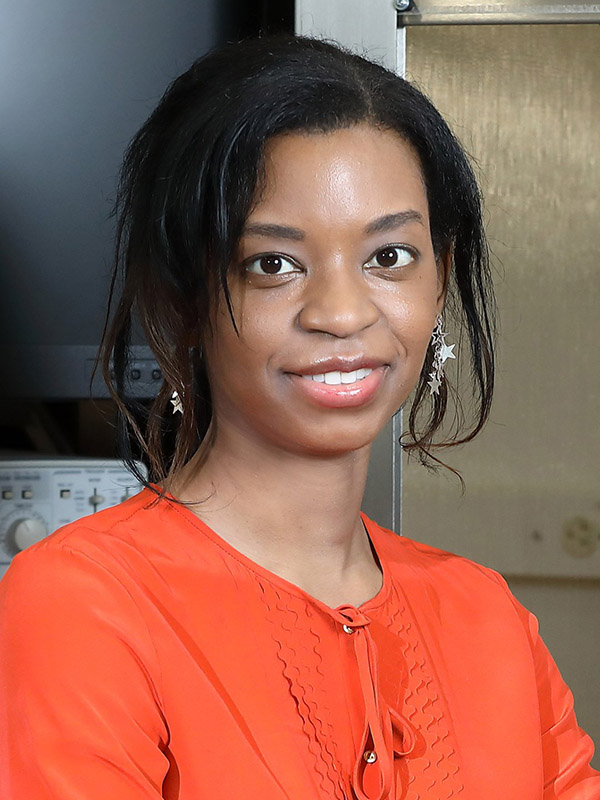
Disorders such as attention-deficit/hyperactivity (ADHD) disorder and autism have conventionally been thought to originate in the brain, but Dr. Michelle Antoine questioned that dogma. While a graduate student in the laboratory of Jean Hébert, Ph.D., a professor in the Dominick P. Purpura Department of Neuroscience and of genetics at Einstein, she found that inner ear sensory defects could lead to long-term changes in forebrain physiology that underlie abnormal behavior. “Michelle continues to remain ahead of the game by thinking about, identifying, and addressing novel and fundamentally important questions that are overlooked by others,” said Dr. Hébert in his letter recommending Dr. Antoine for the Rising Star—Scientific Investigator Award.
Dr. Antoine’s upward trajectory began at Einstein, where she received a Julius Marmur Graduate Research Award. She continued her work as a postdoctoral fellow at the University of California, Berkeley, and is now a tenure-track investigator at the National Institute on Alcohol Abuse and Alcoholism, where she heads the section on neural circuits. Her current research integrates genetic, pharmacological, behavioral, synaptic, and circuit-level methodologies to explore the neural underpinnings of such conditions as autism, seizure disorders, ADHD, intellectual dysfunction, and fetal alcohol spectrum disorder. She has been named a distinguished NIH scholar and is a member of the American Association for the Advancement of Science.
Dr. Antoine, why did you decide to pursue your Ph.D.?
Dr. Antoine: “I had an experience in the lab as an undergraduate that vividly demonstrated the logically based nature of science. It underscored that the principles underlying our knowledge are highly reproducible. This realization made science feel very tangible and authentic to me, and sparked my passion to delve deeper into biology.”
What mentors at Einstein helped you in your career?
“First of all, my thesis mentor, Jean Hébert, equipped me with the tools necessary to be critical and provided me with an environment where I had the freedom to explore, tinker, and problem-solve. Hannes Buelow, Jack Lenz, and Joe Arezzo made science a collaborative, welcoming environment. Bernice Morrow helped me see that a career in research was within my reach. At the NIH, I started a collaborative program so trainees have a mentor at both the NIH and Howard University.”
How did your experience at Einstein influence your career?
“In the neuroscience department at Einstein, the standards they set for trainees are high. They equip trainees with the tools that they need. They’re not simply graduating trainees regardless of level of preparedness. Also, at Einstein, I had freedom and independence. Elsewhere, that wasn’t the default state, and it was eye opening. Because I had that foundation, I was able to adapt and carve out a part of a project where that independent spirit could carry me. If I had submitted to the way things were done in those other places, I wouldn’t have been able to check the boxes I needed to move ahead.”
What is the professional accomplishment that you are most proud of?
“I’m proud of my work at Einstein and Berkeley because the findings have broad implications. More importantly, my experience at Einstein taught me the value of perseverance, that ultimately it can pay off. That was a crucial lesson that I needed to carry me through this career. Papers age, accomplishments age, but the character that you build as a result of your experience endures.”
What advice would you have given yourself in graduate school? Or what advice would you give our current and future students at Einstein?
“For both, I’d say avoid the rigid five-year clock. Instead, let the trajectory of your science guide you to a reasonable timeline. Consider your aspirations and ask yourself, ‘Do I currently have what I need at this time to move on?’ The five-year clock focuses some people, but a lot of times, because they’re under stress to move on, they drop the work. I sit on a few graduate committees, and I tell the students, ‘Just breathe, just relax, take this one piece at a time, and you’re going to get through.’ If they persevere, they’ll get a concrete answer and make a bigger impact.”
2024 Alumni Awardees